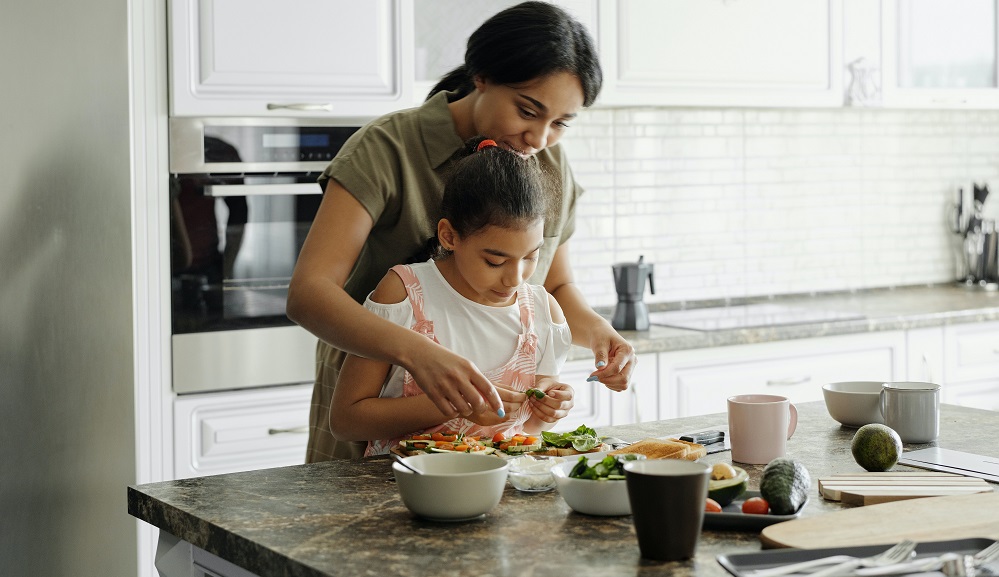
School Entrance
We're here to help you and your child navigate the admissions process from start to finish.
Cooking with Children: The Benefits
Shrove Tuesday (otherwise known as ‘Pancake Day’) fast approaches – what better time to get into the kitchen with your children? Indeed, cooking has been a popular pastime throughout the pandemic: from baking banana bread to starting sourdough, it’s an activity that brings families together and one that guarantees fun (even if we’re stuck indoors!).
But did you know that there are many educational benefits to cooking with children? From developing motor skills to building confidence, time spent in the kitchen is, well, time well spent! Here’s why you might want to consider putting away your ruler and picking up a spatula this weekend.
Educational Benefits of Cooking
A kitchen is so much more than a place where food is made. For children, it’s a treasure trove of learning that engages all their senses – a place where they can learn without even being aware of it. Cooking and baking nurtures and improves:
- Socio-emotional development. Learning how to follow a recipe is an important skill in itself, but this practice brings with it a wide range of benefits: teaching children to be independent, develop problem-solving skills and comprehension skills, learning how to follow directions without intervention, and also improving confidence.
- Cognitive development. Through counting, measuring, following instructions, and more, cooking allows children to respond to – and apply – knowledge in a different way, improving their problem-solving, creativity, and sense of cause and effect.
- Motor skills and co-ordination. By practising chopping, mixing, grating, etc., children are given the opportunity to develop fine motor skills and eye-hand coordination.
- Confidence. Mastery in the kitchen imbues children with confidence for the reasons mentioned above (development of key skills), but can also build self esteem in other ways. For example, children who cook at home typically feel a sense of accomplishment – that they’ve made a valuable contribution to family life – which improves their sense of self worth. In addition, ownership of this task – taking care of all processes, from the preparation of the meal to the clean up – also helps them to learn the importance of taking responsibility.
- Education around healthy habits. Studies have shown that children who learn how to cook are less likely to reach for processed foods in future – the importance of which cannot be understated, as it’s thought that the increased popularity of processed foods has been a huge contributor to the current obesity epidemic. Through cooking, children learn about the provenance of different foods, nutrition, and how to make healthy food choices. In addition, time in the kitchen means time spent away from screens – an extra bonus!
- Their palette. If your child is a fussy eater, learning to cook can introduce them to different tastes and sensations in an exciting, fun way. You can also emphasise the importance of all sensations: touching foods and smelling them, as well as tasting and looking. This increased exposure will help to build positive associations with unfamiliar ingredients and, in time, improve their willingness to try different types of food.
Cooking with Children: Things to Remember
When cooking with children, there are a few key things to bear in mind – and lessons to impart – to ensure the activity is both enjoyable and successful.
Safety in the kitchen. Before delving into the more exciting elements of cooking, it’s crucial to first teach your children some key safety lessons. Show them how to use kitchen tools safely (perhaps utilising special ‘kid-friendly’ knives, etc.), how to turn appliances on and off, and when/how to use oven gloves. Be sure to always supervise, no matter how confident your child may be: even if they know how to handle a hot pan, their motor skills or strength might not be as advanced as their understanding, so it’s best to keep a close eye on them – whatever stage they’re at.

Talk about it! The best way to get children fully involved in meal preparation (and even clear-up duty) is to ask for their input. Discuss what you’re going to be making or eating, what recipes to try, and even what ingredients to buy. Ask questions. Find out what they like or don’t like, or what they think complements the flavour of the dish. Explore their palettes and talk about some of your favourite foods, too, to encourage them to try new things. Model good behaviours – try new foods, even if you don’t feel all that enthused about the idea! Let them choose what dinnerware to use and put them in charge of setting the table. Even small tweaks can turn the most hesitant of eaters into a confident young chef with an adventurous appetite and many important life skills!
Get in Touch
Find out how Mentor can help you support you and your child as you approach the 7+. Get in touch today.
-
Give us a call
020 8883 2519 -
Email us
hello@mentoreducation.co.uk -


